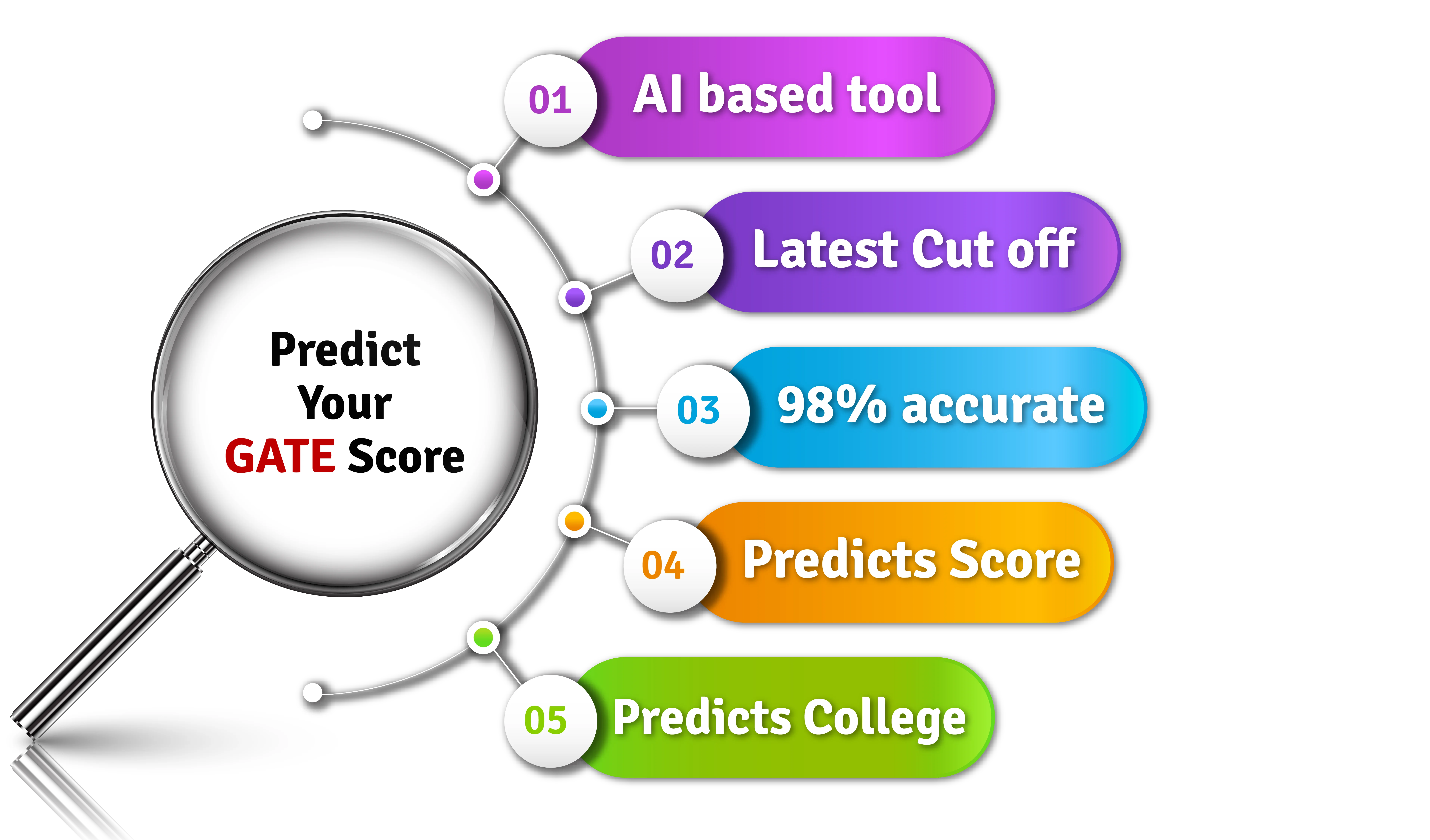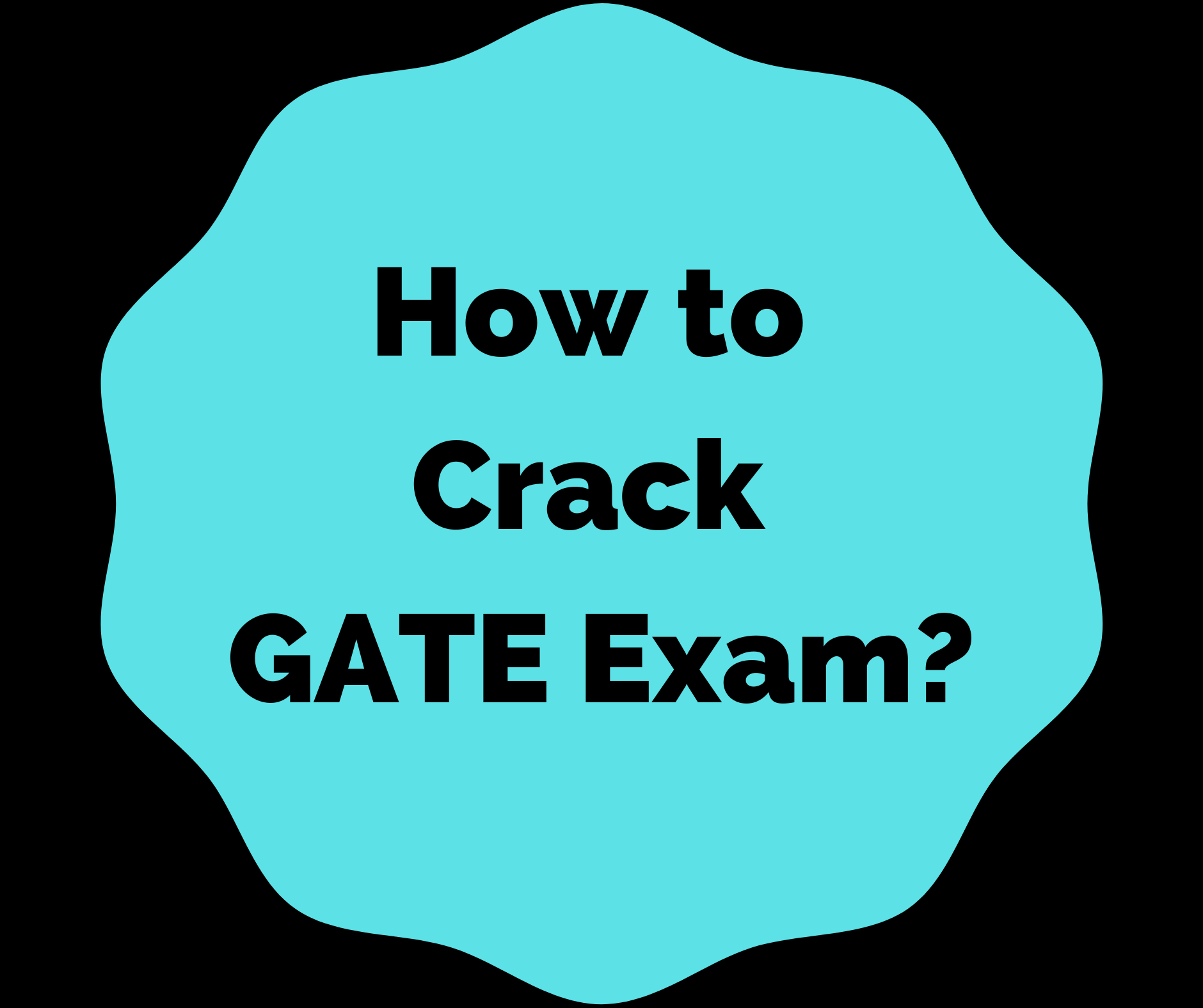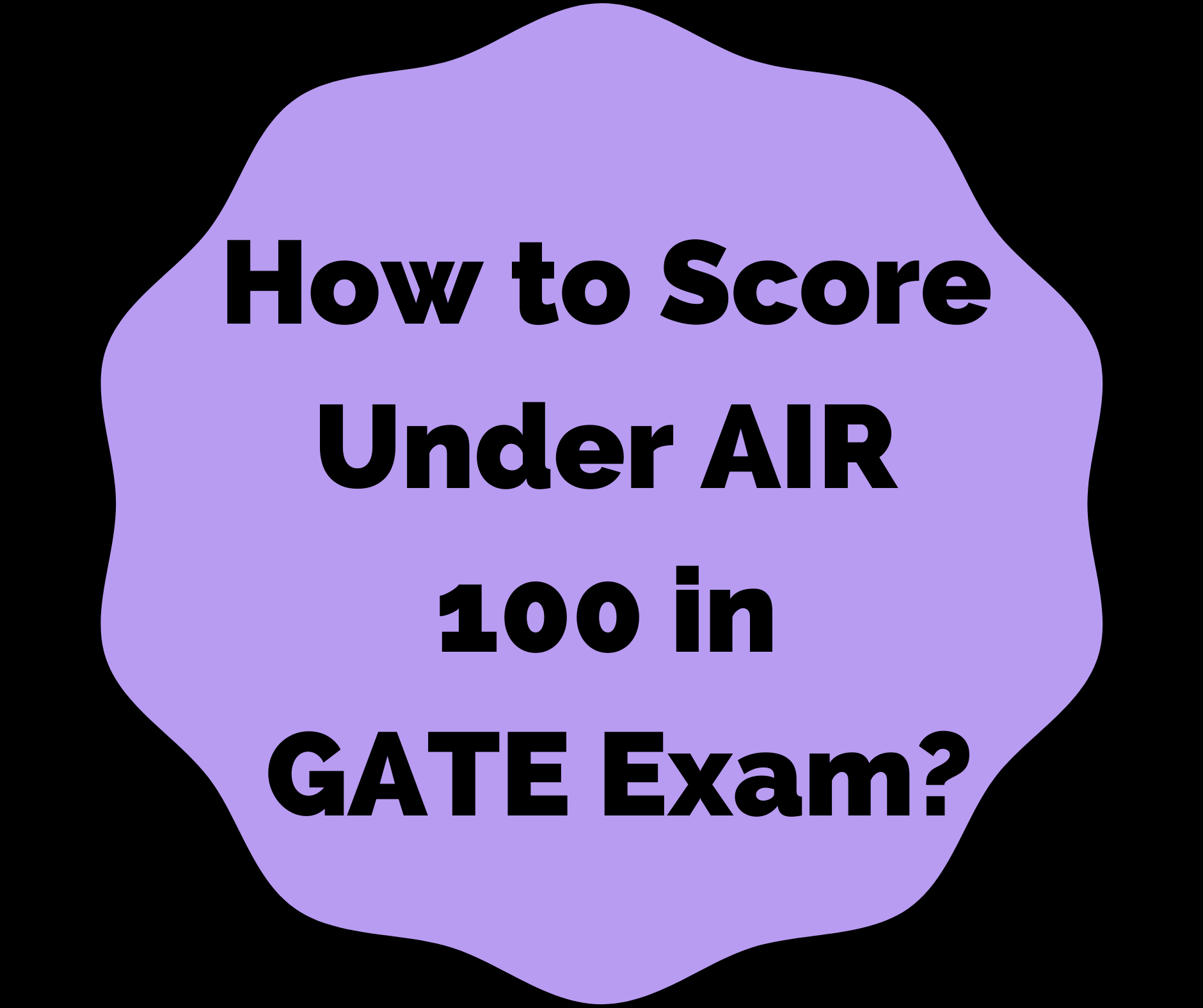
Previous 5 years GATE cut off
| Paper Name | Paper Code | 2020 | 2019 | 2018 | 2017 | 2016 | ||||||||||
| General | OBC (NCL) | SC/ST
/PwD |
General | OBC (NCL) | SC/ST
/PwD |
General | OBC (NCL) | SC/ST
/PwD |
General | OBC (NCL) | SC/ST
/PwD |
General | OBC (NCL) | SC/ST
/PwD |
||
| Mechanical Engineering | ME | 34.0 | 30.6 | 22.6 | 34.1 | 30.7 | 22.7 | 34.7 | 31.2 | 23.1 | 32.9 | 29.0 | 21.0 | 29.6 | 26.6 | 19.7 |
| Computer Science Engineering | CSE | 28.5 | 25.6 | 19.0 | 29.5 | 26.6 | 19.7 | 25.0 | 22.5 | 16.6 | 25.0 | 22.5 | 16.6 | 25.0 | 22.5 | 16.6 |
| Civil Engineering | CE | 32.9 | 29.6 | 21.9 | 28.2 | 25.4 | 18.8 | 26.9 | 24.2 | 17.9 | 28.7 | 25.8 | 19.1 | 25.0 | 22.5 | 16.6 |
| Electrical Engineering | EE | 33.4 | 30.0 | 22.2 | 39.6 | 35.6 | 26.4 | 29.1 | 26.1 | 19.4 | 25.2 | 25.2 | 16.7 | 25.1 | 22.5 | 16.7 |
| Electronics and Communication Engineering | EC | 28.8 | 25.9 | 19.2 | 26.7 | 24.0 | 17.8 | 25.0 | 22.5 | 16.6 | 25.0 | 22.5 | 16.6 | 25.0 | 22.5 | 16.6 |
| Chemical Engineering | CH | 35.7 | 32.1 | 23.8 | 34.8 | 31.3 | 23.2 | 37.8 | 34.0 | 25.1 | 44.3 | 39.8 | 29.5 | – | – | – |
| Instrumentation Engineering | IN | 34.6 | 31.1 | 23.0 | 31.9 | 28.7 | 21.3 | 37.1 | 33.3 | 24.7 | 34.6 | 31.1 | 23.0 | 31.6 | 28.4 | 21 |
How to calculate GATE Score?
The biggest query students will generally have after the GATE exam is how to calculate the GATE score, and what is the normalization score process? Few papers of the GATE exam like Mechanical, Computer Science and Civil Engineering are scheduled in more than one session. Since, the difficulty level of the same paper conducted in different slots may vary, GATE Normalization process is implemented to arrive at an impartial score.
But before understanding the calculation of GATE score, it is necessary to understand the aspects related to this:
- Actual GATE Marks: Actual marks are those marks, students get in their paper out of 100.
- Normalized GATE Marks:
- Many GATE papers are conducted in multiple sessions, and hence to arrive at a normalized score of these multiple session papers, normalization process is applied to normalize the variations in difficulty levels of the question papers across the different slots/sessions.
- This normalization process is done on the basis of the assumption that “in all multi-session GATE papers, the distribution of the abilities of the candidates is the same across all the sessions”.
- GATE Score:
- GATE score is the score which is calculated out of 1000.
- GATE scores for the papers conducted in one session, is calculated by using actual marks only. On the other hand, GATE scores for the papers conducted in multiple sessions, is calculated by converting into normalized marks first and then GATE score.
Formula for calculating normalized marks:

Where,
Mij: is the actual marks obtained by the jth candidate in ith session
Mtg: is the average marks of the top 0.1% of the candidates considering all sessions
Mqg: is the sum of mean and standard deviation marks of the candidates in the paper considering all sessions
Mti: is the average marks of the top 0.1% of the candidates in the ith session
Miq: is the sum of the mean marks and standard deviation of the ith session
Formula for calculating GATE Score:

M: marks obtained by the candidate (actual marks for single session papers and normalized marks for multi-session papers)
Mq: is the qualifying marks for general category candidate in the paper
Mt: is the mean of marks of top 0.1% or top 10 (whichever is larger) of the candidates who appeared in the paper (in case of multi-session papers including all sessions)
Sq: 350, is the score assigned to Mq
St: 900, is the score assigned to
Student’s Testimonial
Previous Year GATE Score & Rank
The Following table depicts the year-wise analysis we have done to identify what score and rank students will get based on their marks. By following this table you can estimate what score and rank you will secure based on your marks.
| MECHANICAL ENGINEERING | Civil Engineering | Computer Engineering | Electronics Engineering | Electrical Engineering | Instrumentation Engineering | Chemical Engineering | |||||||||||||||
| YEAR | Marks | GATE SCORE | GATE RANK | Marks | GATE SCORE | GATE RANK | Marks | GATE SCORE | GATE RANK | Marks | GATE SCORE | GATE RANK | Marks | GATE SCORE | GATE RANK | Marks | GATE SCORE | GATE RANK | Marks | GATE SCORE | GATE RANK |
| 2020 | 80+ | 900-1000 | 1 to 50 | 80+ | 900-1000 | 1 to 10 | 80+ | 950-1000 | 1 to 15 | 80+ | 950-1000 | 1 to 10 | 80+ | 920-1000 | 1 to 20 | 80+ | 910-1000 | 1 to 3 | 80+ | 950-1000 | 1 to 5 |
| 70-80 | 800-900 | 50 to 800 | 70-80 | 750-900 | 10 to 800 | 70-80 | 850-950 | 15 to 200 | 70-80 | 850-950 | 10 to 100 | 70-80 | 820-920 | 20 to 180 | 70-80 | 790-910 | 3 to 50 | 70-80 | 800-950 | 5 to 30 | |
| 60-70 | 650-800 | 800 to 3500 | 50-70 | 500-750 | 800 to 5000 | 60-70 | 700-850 | 200 to 700 | 60-70 | 700-850 | 100 to 400 | 50-70 | 560-820 | 180 to 3000 | 60-70 | 660-790 | 50 to 150 | 50-70 | 500-800 | 30 to 1000 | |
| 30-60 | 400-650 | 3500+ | 30-50 | 350-500 | 5000+ | 30-60 | 350-700 | 700+ | 30-60 | 400-700 | 400+ | 30-50 | 400-560 | 3000+ | 35-60 | 350-660 | 150+ | 30-50 | 350-500 | 1000+ | |
| 2019 | 80+ | 850-1000 | 1 to 300 | 80+ | 900-1000 | 1 to 10 | 80+ | 900-1000 | 1 to 20 | 80+ | 900-1000 | 1 to 10 | 90+ | 870-1000 | 1 to 100 | 80+ | 950-1000 | 1 to 1 | 80+ | 950-1000 | 1 to 2 |
| 70-80 | 700-850 | 300 to 1500 | 70-80 | 850-900 | 10-250 | 70-80 | 800-900 | 20 to 200 | 70-80 | 850-900 | 10 to 150 | 80-90 | 760-870 | 100 to 800 | 70-80 | 830-950 | 1 to 23 | 70-80 | 820-950 | 2 to 35 | |
| 60-70 | 600-700 | 1500 to 5000 | 50-70 | 600-850 | 250-3500 | 60-70 | 550-800 | 200-1000 | 50-70 | 600-850 | 150 to 1900 | 60-80 | 550-760 | 800 to 6000 | 60-70 | 700-830 | 23 to 100 | 50-70 | 550-820 | 35-750 | |
| 30-60 | 350-600 | 5000+ | 30-50 | 350-600 | 3500+ | 30-60 | 350-550 | 1000+ | 30-50 | 350-600 | 1900+ | 30-60 | 350-550 | 6000+ | 35-50 | 350-700 | 100+ | 30-50 | 350-550 | 750+ | |
| 2018 | 90+ | 900-1000 | 1 to 10 | 90+ | 975-1000 | 1 to 1 | 80+ | 1000 to 1000 | 1 to 3 | 80+ | 950-1000 | 1 to 10 | 90+ | 980-1000 | 1 to 2 | 90+ | 970-1000 | 1 to 4 | 80+ | 950-1000 | 1 to 5 |
| 80-90 | 800-900 | 10 to 500 | 80-90 | 800-975 | 1 to 50 | 70-80 | 850-1000 | 3 to 100 | 70-80 | 800-950 | 10 to 100 | 80-90 | 910-980 | 2 to 36 | 80-90 | 850-970 | 4 to 25 | 70-80 | 800-950 | 5 to 30 | |
| 60-80 | 600-800 | 500 to 3500 | 60-80 | 700-800 | 50 to 2000 | 60-70 | 700-850 | 100-1000 | 50-70 | 700-800 | 100 to 300 | 60-80 | 660-910 | 36 to 3000 | 75-80 | 790-850 | 25 to 70 | 50-70 | 500-800 | 30 to 1000 | |
| 30-60 | 400-600 | 3500+ | 30-60 | 350-700 | 2000+ | 30-60 | 350-700 | 1000+ | 30-50 | 350 to 700 | 300+ | 30-60 | 250-660 | 3000+ | 50-75 | 500-790 | 70+ | 30-50 | 350-500 | 1000+ | |
| 2017 | 90+ | 950-1000 | 1 to 10 | 90+ | 900-1000 | 1 to 5 | 80+ | 960-1000 | 1 to 5 | 80+ | 1000 to 1000 | 1 to 3 | 80+ | 1000-1000 | 1 to 3 | 90+ | 890-1000 | 1 to 1 | 80+ | 950-1000 | 1 to 3 |
| 80-90 | 800-950 | 10 to 400 | 80-90 | 800-900 | 5 to 50 | 70-80 | 860-960 | 5 to 100 | 70-80 | 900 to 1000 | 3 to 55 | 70-80 | 900 to 1000 | 3 to 30 | 80-90 | 770-890 | 1 to 19 | 70-80 | 800-950 | 3 to 30 | |
| 60-80 | 650-800 | 400 to 5000 | 60-80 | 700-800 | 50 to 2500 | 50-70 | 500-860 | 100 to 1500 | 50-70 | 650 to 900 | 55 to 1500 | 50-70 | 660-900 | 30 to 1600 | 50-70 | 530-770 | 19 to 100 | 50-70 | 500-800 | 30 to 1000 | |
| 30-60 | 400-650 | 5000+ | 30-60 | 350-700 | 2500+ | 30-50 | 350-500 | 1500+ | 30-50 | 400 to 650 | 1500+ | 30-50 | 400-660 | 1600+ | 35-50 | 350-530 | 100+ | 30-50 | 350-500 | 1000+ | |
Branch wise analysis of previous year GATE exam
In this section, you will find the topic wise paper analysis of previous years papers. By referring to this, you will get an idea about which topic carries how much weightage and according to that you can prepare your GATE preparation plan.
No of students appeared for GATE
| Paper Name | Paper Code | 2020 | 2019 | 2018 | 2017 | 2016 |
| Total No of students appeared | 6,85,000 | 7,79,632 | 7,81,461 | 7,87,148 | 8,18,850 | |
| Mechanical Engineering | ME | 1,98,844 | 1,67,376 | 1,94,496 | 1,90,648 | 1,97,789 |
| Computer Science Engineering | CSE | 1,02,494 | 99,932 | 1,07,893 | 96,878 | 1,08,495 |
| Civil Engineering | CE | 1,07,999 | 1,45,064 | 1,53,078 | 1,29,225 | 1,19,873 |
| Electrical Engineering | EE | 1,02,294 | 1,12,097 | 1,21,383 | 1,17, 443 | 1,25,859 |
| Electronics and Communication Engineering | EC | 1,01,148 | 1,04,782 | 1,25,870 | 1,41, 665 | 1,52,318 |
| Chemical Engineering | CH | 14,783 | 15,537 | – | 15.188 | 15,495 |
| Instrumentation Engineering | IN | 10,289 | 9,999 | 11,852 | 12,858 | 14,804 |
Year wise list of GATE Exam conducting institutes
Every year GATE exam is conducted by any of the 8 institutes i.e. IISc and other 7 IITs (Bombay, Delhi, Kanpur, Kharagpur, Guwahati, Roorkee, Madras). Every institute get a chance to organize GATE Exam at regular intervals. If you follow the below table you find that every institute’s turn repeats every 8 years until a new IIT gets added to this list. By following this cycle, you can predict which IIT will conduct GATE exam in the coming years.
| GATE Exam Year | Conducting Authority | GATE Exam Year | Conducting Authority |
| GATE 1984 | IISc, Bangalore | GATE 2004 | IIT, Delhi |
| GATE 1985 | IIT, Madras | GATE 2005 | IIT, Bombay |
| GATE 1986 | IIT, Delhi | GATE 2006 | IIT, Kharagpur |
| GATE 1987 | IIT, Bombay | GATE 2007 | IIT, Kanpur |
| GATE 1988 | IIT, Kharagpur | GATE 2008 | IISc, Bangalore |
| GATE 1989 | IIT, Kanpur | GATE 2009 | IIT, Roorkee |
| GATE 1990 | IISc, Bangalore | GATE 2010 | IIT, Guwahati |
| GATE 1991 | IIT, Madras | GATE 2011 | IIT, Madras |
| GATE 1992 | IIT, Delhi | GATE 2012 | IIT, Delhi |
| GATE 1993 | IIT, Bombay | GATE 2013 | IIT, Bombay |
| GATE 1994 | IIT, Kharagpur | GATE 2014 | IIT, Kharagpur |
| GATE 1995 | IIT, Kanpur | GATE 2015 | IIT, Kanpur |
| GATE 1996 | IISc, Bangalore | GATE 2016 | IISc, Bangalore |
| GATE 1997 | IIT, Madras | GATE 2017 | IIT, Roorkee |
| GATE 1998 | IIT, Delhi | GATE 2018 | IIT, Guwahati |
| GATE 1999 | IIT, Bombay | GATE 2019 | IIT, Madras |
| GATE 2000 | IIT, Kharagpur | GATE 2020 | IIT, Delhi |
| GATE 2001 | IIT, Kanpur | GATE 2021 | IIT, Bombay |
| GATE 2002 | IISc, Bangalore | GATE 2022 | IIT, Kharagpur |
| GATE 2003 | IIT, Madras | GATE 2023 | IIT, Kanpur |
Strategy plan for GATE 2022
It is always beneficial if you start preparing for the GATE exam early. By starting early, you can devote more time to important topics and questions. You can plan your studies in advance and can solve more previous years GATE questions.
To help you out with the preparation plan, we have prepared a 300 days preparation plan on the basis of our experience and our topper’s preparation strategy.
Prepare for an Interview
Most students say, “It’s easy to crack any entrance exams. The Difficult part comes into the picture while preparing for an interview”. We believe if you prepare well enough for an interview, you can crack any interview very easily. In order to help you, we have developed a special programme for you so that you can prepare well for an interview, which is called as ‘TECHNO INTERVIEWS’.
What will you learn in this course?
- Techniques of cracking technical interviews
- Building your technical resume
- Types of interviews and question types
- Mock interview practice
- Dos and Don’ts for technical interview
Previous Year GATE Questions
Once you start preparing for the GATE exam, the very initial step would be to analyze previous years papers to get an idea about the weightage and marking system of different subjects and their respective topics. So, here we are providing branch wise GATE previous year question papers so that you can easily identify weightage system, and you can solve questions of GATE previous years papers too.
About GATE Exam
The Graduate Aptitude Test in Engineering (GATE) is a computer-based standardized examination conducted at a national level. Indian Institute of Science (IISc) and 7 Indian Institutes of Technology (IITs- Bombay, Delhi, Kanpur, Kharagpur, Guwahati, Madras and Roorkee) jointly conduct GATE Examination.
It examines the basic understanding of subjects related to engineering and science and students who are seeking an admission to the post graduates program, doctoral program and PSU jobs apply for the GATE exam.
What’s new in GATE Exam 2022?
- Eligibility criteria to appear for GATE-2022 has been relaxed from the minimum 10+2+4 (ongoing) to minimum 10+2+3 (ongoing), enabling the third-year students of undergraduate studies to appear for gate 2022 examination.
- All Test Papers of GATE 2022 will be entirely objective type. The Pattern of questions may include: (i) Multiple-Choice Questions (MCQ), (ii) Multiple Select Questions (MSQs) and (iii) Numerical Answer Type (NAT) questions.
- Two new subjects–Environmental Science and Engineering (ES) and Humanities and Social Science (XH) have been added. The total number of subjects in GATE 2022 is now increased to 27.
- Students applying for GATE 2022 can also opt for two subject papers from the prescribed set of combinations.
FAQs
What is the reliability of this predictor?
This predictor tool is prepared on the experience and many trials. We have got almost 99% accurate results by using this tool. You can check our testimonials too to check the reliability of this tool.
How are these scores predicted by the Predictor?
We have been teaching GATE students for more than a decade. The prediction is made on the basis of an experienced and qualified faculty team along with past year Data Analysis. We are predicting the scores of students based on actual data of the last 3 years. Almost 90% of our users say that the GATE predictor predicted their score almost 100% Correct.
What is the source of information given in the video?
With more than a decade experience in the industry, we have numerous alumni who have passed out of these colleges or are currently studying in these colleges. Generally, this information is not available on IIT websites, but we have interviewed our own alumni to fetch this information.
If I am taking GATE in my pre final year, will there be any advantage?
GATE does not differentiate between a first time taker or a repeater. So you won’t be getting any advantage in scores. But yes, in the interview this will be an advantage as you can impress the panel by your knowledge despite being in the pre final year.
I have taken GATE 2020, and also I am appearing for GATE 2022. Which score will be considered?
GATE score, for any masters course admission, is valid for 3 years. If you have appeared for GATE in the recent three years, you can apply on the basis of the best score you have.
Will this predictor provide information about IITs only ?
The beauty of this predictor is that it does not only help you select your dream IIT but also gives you information about NITs, PSUs and top Masters’ College in India.
Is there any separate form to be filled for different IITs?
Yes, once the GATE results are out, you will have to visit websites of various IITs to fill their individual admission forms.
How does admission get done in NITs?
- Admission in all 30 National Institute of Technology (NITs) takes place through a common counselling called as CCMT. This takes place generally a month after the GATE results declaration.
- One has to fill the common form, select NIT and branch of preference. Finally, after filling this information the college is allocated. It is very similar to the process which is followed by many state universities to take admission on the basis of JEE exam. There are various rounds of this process.
Can I connect to any alumnus of yours or can I get a Mentor for my interview preparation?
Yes, we provide you with a program called Techno PDP. If you enroll for this, you will be allocated a faculty mentor who will help you to prepare for interviews and also an alumni interaction will be arranged for you over video call. The interview practice and feedback for improvement will be done online. If you wish to enroll for the program please write a mail to support@gateflix.in
How is the qualifying cut off for GATE decided?
The qualifying cut off for the GATE exam is decided on the basis of the following factors:
- Total number of candidates appeared for GATE exam
- Total number of seats available
- The difficulty level of exam
- Total number of applications received for the admission in various programs
- The category of the candidates










